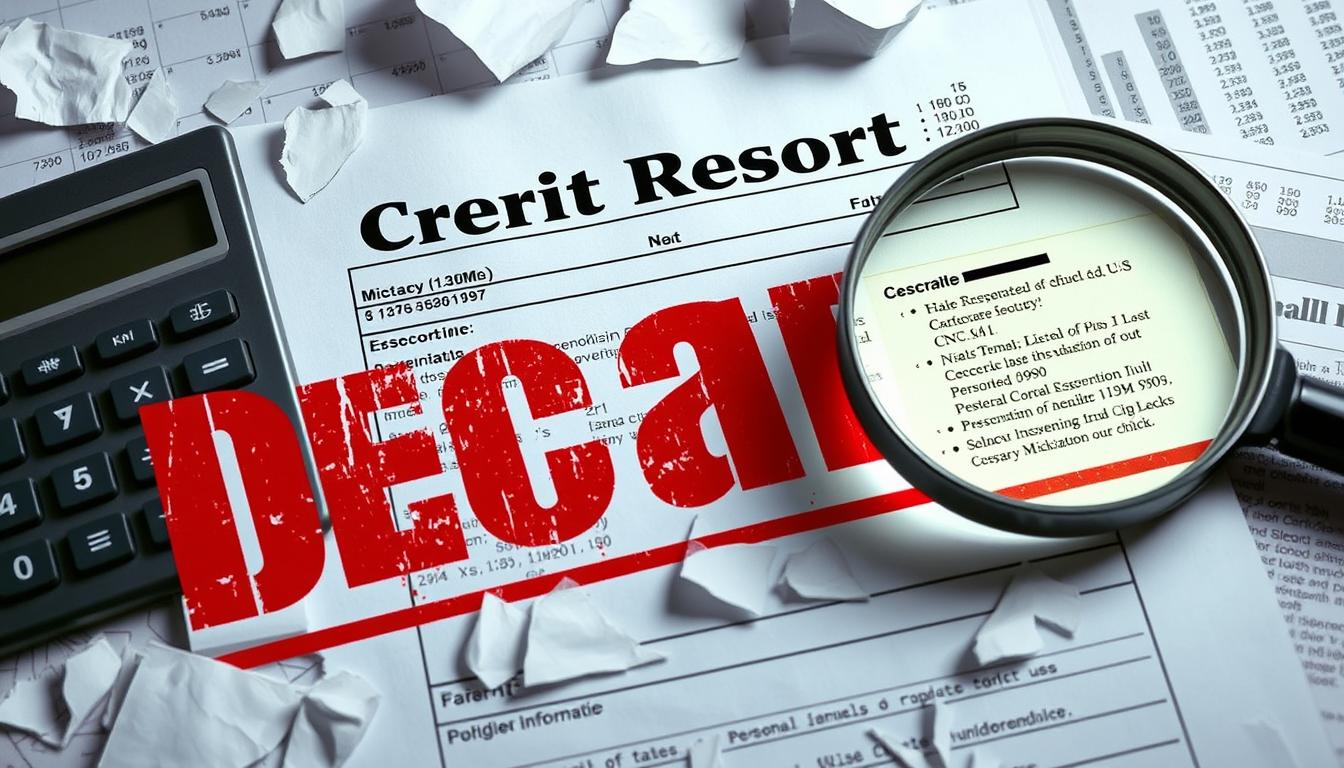Credit disputes can be tricky, but you can challenge errors on your report successfully. This guide will help you improve your credit score. You’ll learn how to dispute inaccuracies and get the credit score you deserve.
We’ll cover strategies for effective communication with credit bureaus. You’ll also discover techniques for addressing specific errors on your report. Staying persistent is key to resolving credit disputes successfully.
Key Takeaways
- Understand the importance of disputing errors on your credit report and how it can impact your financial well-being.
- Learn the step-by-step process of preparing a compelling credit dispute letter and providing clear and concise evidence.
- Discover strategies for effectively communicating with credit bureaus and following the guidelines of the Fair Credit Reporting Act.
- Explore techniques for addressing specific credit report errors, such as inaccurate personal information and incorrect payment history.
- Gain insights on how to stay persistent and follow up with credit bureaus to ensure a successful credit dispute resolution.
Understanding Credit Disputes and Their Importance
A healthy credit report is vital for your financial well-being. Credit disputes address errors on your credit report. These credit report errors can hurt your creditworthiness, so it’s crucial to dispute them.
What is a Credit Dispute?
A credit dispute is a formal request to fix errors on your credit report. You can ask Experian, Equifax, or TransUnion to investigate and correct mistakes.
The Fair Credit Reporting Act governs this process. It ensures your right to dispute and fix inaccurate credit report data.
Why Disputing Errors on Your Credit Report Matters
Credit report errors can have serious consequences. They can lower your credit score, making it harder to get loans or credit cards.
These mistakes can even affect your housing and job prospects. Monitoring your credit and disputing errors protects your financial health.
The credit dispute process helps ensure your report accurately shows your creditworthiness. This opens up more chances to reach your financial goals.

“Regularly monitoring your credit report and addressing any errors or inaccuracies is a crucial step towards financial success.”
Understanding credit disputes helps you protect your finances. Taking action to keep your credit report accurate unlocks new opportunities.
It also opens doors to credit counseling services that can further improve your financial situation.
Preparing for a Successful Credit Dispute
Disputing credit report errors is vital for a healthy financial standing. The process can be overwhelming, but proper preparation is key. Gathering documents and reviewing credit reports are essential first steps.
Gathering Necessary Documentation
Having the right documentation is crucial for a successful credit dispute. Collect payment records, account statements, and communications with creditors.
- Payment records: Gather receipts, bank statements, or documents proving timely payments.
- Account statements: Obtain copies to verify information reported on your credit report.
- Communication with creditors: Save letters, emails, or correspondence about disputed items.
Reviewing Your Credit Reports Thoroughly
Carefully examine your credit reports from Experian, Equifax, and TransUnion. Look for credit report errors, debt validation issues, and other discrepancies.
Proper documentation and thorough review set the stage for a strong credit dispute. This preparation is crucial for drafting a compelling credit dispute letter.
| Documentation Needed | Purpose |
|---|---|
| Payment records | Prove on-time payments and dispute inaccurate payment history |
| Account statements | Verify the accuracy of information reported on your credit report |
| Communication with creditors | Support your case and provide evidence of your efforts to resolve the issue |
Drafting a Compelling Credit Dispute Letter
A well-crafted credit dispute letter is crucial for fixing credit report errors. It’s your official message to credit bureaus about report inaccuracies. A structured approach boosts your chances of success in credit repair.
Your credit dispute letter should include these key elements:
- Clearly identify the specific credit report errors you are disputing, including the account numbers, dates, and any other relevant details.
- Provide a concise explanation of why the information is inaccurate or incomplete, and how it should be corrected.
- Gather and attach copies of any supporting documentation, such as payment receipts, settlement agreements, or correspondence with creditors.
- Request that the credit bureau investigate the disputed items and provide you with a written response within the legally required timeframe.
- Include your full name, current address, and contact information, as well as your signature.
Keep your credit dispute letter clear and focused on facts. Avoid emotional language or accusations. Present your case professionally, emphasizing the importance of accurate credit reporting.
A compelling credit dispute letter helps resolve errors and improves your credit. Follow these guidelines to boost your chances of success.

Remember, persistence and attention to detail are key when disputing credit report errors. Don’t be discouraged if the process takes time – your efforts will ultimately pay off in a stronger, more accurate credit profile.
how to win a credit dispute
Winning a credit dispute requires understanding the Fair Credit Reporting Act (FCRA). This law outlines rights and responsibilities for consumers, creditors, and credit bureaus. It covers credit reporting and dispute resolution.
Following the Fair Credit Reporting Act Guidelines
The FCRA provides a framework for credit disputes. Familiarize yourself with its key provisions to ensure proper handling of your dispute.
Know your right to access credit reports and request corrections. Learn about credit bureaus’ obligations to investigate and respond promptly. Understand their duty to notify information providers and update accordingly.
Providing Clear and Concise Evidence
Present clear evidence to support your case when filing a credit dispute. This strengthens your position and increases chances of success.
- Detailed documentation of the inaccurate or disputed information on your credit report.
- Copies of any relevant correspondence or records that corroborate your claim.
- A well-crafted dispute letter that clearly explains the issue and your desired resolution.
Following FCRA guidelines and providing strong evidence boosts your chances of winning. This approach can help improve your credit profile significantly.

“The Fair Credit Reporting Act is your ally in the fight to maintain accurate credit information. Arm yourself with knowledge and evidence to achieve a positive outcome.”
Dealing with Credit Bureaus Effectively
Credit bureaus can be tricky to navigate. Understanding their roles is key for disputing credit report errors. Experian, Equifax, and TransUnion are the three major bureaus.
They maintain your credit history’s integrity. Learning to communicate with them can help resolve credit disputes.
Understanding the Credit Bureau’s Role
Credit bureaus collect and report consumer credit information. They gather data from lenders, creditors, and public records. This data creates your credit report.
Lenders, landlords, and employers use this report. They assess your creditworthiness based on it.
When disputing credit bureaus, know they must verify report accuracy. They follow Fair Credit Reporting Act guidelines. The bureaus check disputed info with the original source.
Effective Communication with Credit Bureaus
- Be organized when submitting your credit dispute. Gather all documents and provide clear evidence.
- Stay persistent and follow up. Credit bureaus must respond within a set timeframe.
- Use credit monitoring services. Review your credit reports regularly for errors.
- Consider credit counseling services if you need help with disputes.
Understanding credit bureaus’ roles improves your dispute chances. Use effective communication strategies. This helps maintain a healthy credit profile.

Strategies for Disputing Specific Credit Report Errors
Credit report errors can be tricky to handle. But with the right strategies, you can dispute inaccuracies effectively. Let’s explore how to win credit disputes and clean up your credit history.
Addressing Inaccurate Personal Information
Errors in personal details can greatly affect your credit report. Start by reviewing your reports and spotting any mistakes. Gather documents that prove the correct information.
When writing your dispute letter, explain the issues clearly. Include copies of evidence to support your claims. This approach helps fix errors in your name, address, or Social Security number.
Challenging Incorrect Payment History
Wrong payment history can hurt your credit score badly. This includes false late payments, charge-offs, or collections. To fight these errors, gather all relevant records.
Write a strong dispute letter highlighting the mistakes. Provide a clear timeline of events to back up your claims. Follow the Fair Credit Reporting Act guidelines for the best results.
Disputing credit report errors takes time and organization. Know your rights and use credit repair strategies. This helps you tackle credit report errors and debt validation effectively.
Staying Persistent and Following Up
Winning a credit dispute takes patience and determination. Don’t get discouraged by slow responses from credit bureaus. Stay persistent to achieve a successful outcome.
Tracking your case’s progress is key to winning a credit dispute. Regularly check your dispute status with credit bureaus. Tracking the progress of your case helps you stay on top of things.
Follow up if you don’t get a timely response. Keep detailed records of every communication. Note dates, times, and names of representatives you spoke with.
- Regularly check the status of your credit dispute with the credit bureaus.
- Follow up if you don’t receive a response within the expected timeframe.
- Maintain detailed records of all communications related to your dispute.
Don’t give up if you face roadblocks from credit bureaus. Be prepared to escalate your dispute by contacting higher-level representatives. Seek help from consumer advocacy organizations if needed.
Credit repair strategies often require sustained effort. The payoff can be significant in the long run. Keep pushing forward to see results.
“Persistence and determination alone are omnipotent. The slogan ‘Press On’ has solved and always will solve the problems of the human race.” – Calvin Coolidge
Staying persistent increases your chances of resolving inaccuracies. It also helps in improving your credit score. View setbacks as chances to refine your approach.
Show your commitment to achieving a fair credit report. Keep working towards resolving inaccuracies and improving your credit score.
Preventing Future Credit Report Errors
Keeping your credit profile healthy requires regular monitoring. Check your credit reports often to spot and fix any mistakes. This ensures your credit history stays accurate and current.
Monitoring Your Credit Reports Regularly
Get your free annual credit report from Experian, Equifax, and TransUnion. Look closely for suspicious activity, errors, or signs of identity theft.
Consider using a credit monitoring service. It can alert you to changes in your credit file.
Maintaining Accurate Financial Records
Keep detailed records of your income, expenses, and payments. Regularly check your accounts to ensure everything is correct.
Good records help you dispute credit report errors. They also guide you in making smart financial choices and improving your credit score.

